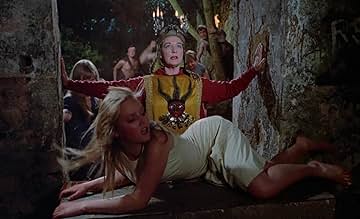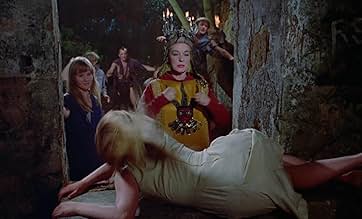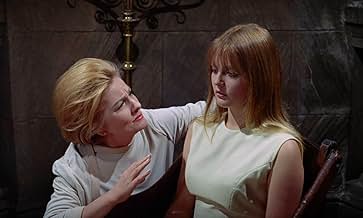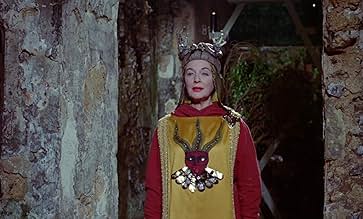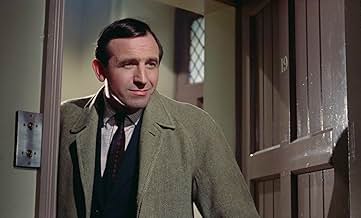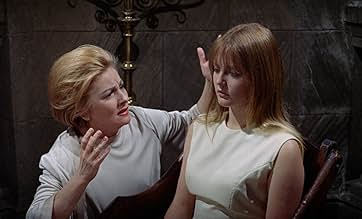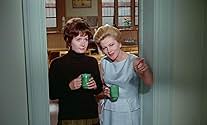Following a horrifying experience with the occult in Africa, a schoolteacher moves to a small English village, only to discover that black magic resides there as well.Following a horrifying experience with the occult in Africa, a schoolteacher moves to a small English village, only to discover that black magic resides there as well.Following a horrifying experience with the occult in Africa, a schoolteacher moves to a small English village, only to discover that black magic resides there as well.
- Linda Rigg
- (as Ingrid Brett)
- Granny Rigg
- (as Gwen Ffrangcon-Davies)
- Mark
- (uncredited)
- Mrs. McDowall
- (uncredited)
- Mr. Glass
- (uncredited)
- Director
- Writers
- All cast & crew
- Production, box office & more at IMDbPro
Featured reviews
As boss witch supreme Stephanie Bax, a character one of the reviewers of the time described as a "lesbian-like writer," Kay Walsh dominates the action from the moment she appears. Of all the various witch films of the Sixties, this one probably has the most realistic atmosphere and the most plausible plot. The traditional opposition between village wise women (capably embodied here by Gwen Ffrangcon-Davies as Granny Riggs--be sure to keep an eye out for her stogie-chomping aristo witch in 1967's The Devil Rides Out) and the kind of ceremonial magician played by Miss Walsh is portrayed quite matter-of-factly in the script. The kind of witchcraft practiced both by the Walsh and the Ffrangcon-Davies characters is a pretty accurate portrayal of practices actually current in Sixties England, for instance in the circles around Robert Cochrane and other figures who were gaining a lot of media attention in those days. The campy elan of Miss Walsh's dances as High Priestess (one wonders how they dealt with all the hot wax that must have flown off the lit candles in that antler-crown of hers) is very London West End on one level, yet also seems a poetic evocation of a learned ceremonial magician taking over a traditional village circle for her own corrupt ends on another level. Excellent work by Miss Walsh and the choreographer.
Also worthy of mention is the appearance of Martin Stephens, who made memorable such earlier Sixties fantasy films as The Innocents and Village of the Damned (in which he had the unenviable task of acting opposite George Sanders--who hated children!). Martin retired from films shortly after appearing in the Witches. Among the others, Alec McCowen turns in a brilliant little gem of a performance as Kay Walsh's traumatized brother.
For all its excellence, Hammer historians give second place for this film to Don Sharp's 1964 outing, Witchcraft. Let's hope somebody hurries up and releases that one on home video soon!
"The Witches" is a Hammer film that can be divided in two parts: the first one, with the arrival of Mayfield to Heddaby, is intriguing and suspenseful. Joan Fontaine, in her last work in the cinema, performs a fragile and vulnerable woman due to a trauma in Africa, and wondering if there are witches in the village. The second part, when she returns from the mental institution, is simply awful. The long ritual of the witches is disgusting and silly, and spoils a promising film. Kay Walsh, the former wife of David Lean, has a great performance, highly above the rest of the cast. My vote is six.
Title (Brazil): "A Face do Demônio" ("The Face of the Demon") Note: On 10 Dec 2018 I saw this film again.
Visually, The Witches, as with most Hammer efforts, looks great. The scenery and sets are both beautiful and eerie, it's stylishly shot and the lighting helps give off an effectively creepy atmosphere. The music is resolutely haunting and has a thrilling intensity while also having the ability of being intimate when it calls for it.
The script does lack horror and mystery, but flow-wise and structurally it flows well and is decently written, and while the film is reasonably tame by today's standards the atmosphere still has a creepiness and the first half interests and entertains mostly. The direction is very competent in the first half and shows great technical assurance but falls flat in the last thirty minutes. The cast are very good and are the best thing about the film aside from the visuals. Joan Fontaine has been better, but the vulnerability of her character is very deeply felt, Alex McCowan has a lot of fun with his role while Kay Walsh's excellent performance steals the film.
As said, the first half is reasonably strong. It does have its flaws, it does move too slowly in places and the prologue was rather vague and somewhat irrelevant. It's always professionally made and well-acted on the whole, and is intriguing and entertaining, with a great creepy atmosphere and some decent suspense.
However, the second half really disappoints. It gets really tedious, gets increasingly confused, suspense, mystery and horror are non-existent and it dissolves into camp, which I don't think was intended. The film's biggest flaw is the climax, which has to be the worst ever ending for a Hammer film with its inept choreography, even worse dancing and it was just too amateurish to even be considered unintentionally funny.
Overall, good first half, but very bad second half. An uneven film, with a lot of strengths and some big flaws. 6/10 Bethany Cox
Leading lady Joan Fontaine was still an impressive screen presence at this time and she portrays the courageous but vulnerable headmistress Gwen Mayfield very well.
But - a little bit about the story. Heroine Gwen suffered a nervous breakdown when in Africa, brought on by a traumatic experience with tribal witchcraft. Gwen recovers and takes a teaching job in a quiet, out of the way English village. Little did she know that even greater horror than what she experienced in Africa awaited her! It takes her awhile to realize that the town is home to a witch's coven, a coven that she will unwillingly be admitted into.
Before we get to this point, the story unfolds with some fairly decent character development. The too-jolly meat cutter Mr. Curd, the dour Granny Rigg and her overly-protected grand daughter Linda, Linda's boyfriend Ronnie and the brother sister team of Alan and Stephanie Bax, very capably portrayed by Kay Walsh and Alec McCowen as the village leaders, are the main characters which keep life interesting for Gwen. One gets a clear sense of life in a small English village, a place where fear and superstition become horrible reality.
The problem with reviewing The Witches is, if too much of the film is detailed, the ending is predictable and viewing ruined for those who have not seen it. Keep in mind this is a Hammer film and is similar to other films of the day, such as The Plague of the Zombies, (1966, also by Hammer), and 1960's City of The Dead, (AKA Horror Hotel), to name a couple.
If you are a fan of horror, and I suspect you are if you are reading this review, then you are probably already aware of this film and its exciting conclusion. This was one of Ms. Fontaine's last major screen roles so view it for this reason if for no other.
Did you know
- TriviaThis was Joan Fontaine's final film, perhaps due to its poor box office reception, though she continued to work consistently in television well into the 1980s (one final project came in 1994).
- GoofsWhen Linda starts dancing in the finale, Tom's position changes between long shots and close-ups.
- Quotes
Gwen Mayfield: Look at this! Stuck full of pins and it's head missing. What do you think it could possible be?
Stephanie Bax: Witchcraft? Somebody having a little dabble? Yes, I would think so. Or did you think I was going to say, no no no, it can't happen here? I bet there are lots of remote spots where remnants of witchcraft are still practiced. Places like Heddaby, in fact. I've often wondered.
Gwen Mayfield: Well, what are we going to do?
Stephanie Bax: Do? Ah.
Gwen Mayfield: Well, I'd like to start by removing those pins.
Stephanie Bax: Yes, we could- Oh, no! Emphatically not! Do you see why? Well, that would mean admitting belief in it all, for ourselves I mean.
Gwen Mayfield: Oh, I see!
Stephanie Bax: I did some articles on witches once. No, not witches, damn them, people who thought they were witches. The psychology of it. It's a sex thing deep down, of course, mostly women go in for it, older women.
Gwen Mayfield: Like, um, Mrs. Rigg, for instance?
Stephanie Bax: Yes. They relish the idea of a secret power, especially when their normal powers are failing. Now, they may believe in it, the point is, do we? What are we giving into if we admit the possibility that a healthy young kid can be put in hospital by mere ill will? That's where it gets fascinating.
Gwen Mayfield: I see, what we admit we believe and what we believe I suppose, could destroy us.
Stephanie Bax: Beautifully put.
- ConnectionsFeatured in Les Archives de la Hammer: Wicked Women (1994)
- How long is The Witches?Powered by Alexa
Details
- Release date
- Country of origin
- Language
- Also known as
- Les sorcières
- Filming locations
- Bray Studios, Down Place, Oakley Green, Berkshire, England, UK(Studio Interiors)
- Production companies
- See more company credits at IMDbPro
- Runtime
- 1h 30m(90 min)
- Aspect ratio
- 1.66 : 1


